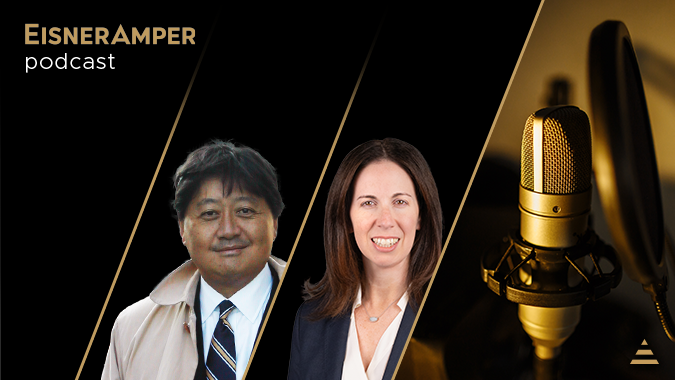
COVID-19: Considerations for Alternative Investment Funds: Capital Raising
- Published
- Apr 9, 2020
- Topics
- Share
Just two months ago, it was business as usual for alternative investment fund managers looking to raise capital. Traditional lines of communication were open and capital was running smoothly between limited partners (LPs) and general partners (GPs). In the past eight weeks, COVID-19 has completely transformed their capital raising strategies. Over the past fortnight, EisnerAmper has spoken with LPs, GPs and consultants to gather insight into what is considered the new normal – and, somewhat surprisingly, it was not all bearish.
WHERE IS CAPITAL BEING ALLOCATED?
Established funds who have built a strong relationship amongst the institutional investor community are at an advantage for receiving allocations compared to funds looking to raise capital for the first time.
“We are seeing capital flow to the well-established funds who have been around for a long time; funds that are approved by consultants and whose operational due diligence (ODD) has already been completed,” said a managing director of a well-established West Coast placement agent. “These managers are at a stage where they can discuss investment strategy and market opportunity directly with the capital allocators.”
WHAT IS SLOWING CAPITAL DOWN?
It is important to take into consideration that almost all institutional allocators have strict ODD guidelines in place that must be completed prior to allocations being made. One common step in the ODD process is a site visit/face-to-face meeting with a potential manager. With current travel restrictions in place, these meetings are simply not happening. For some allocators, this means that this step in the ODD process is on hold.
“For new managers, COVID-19 has definitely made fundraising more difficult, or at least slowed it down,” said one emerging manager based in San Francisco who is still planning to launch in Q2. “Allocators seem to be hunkered down and focused on their existing portfolios. No one will allocate to a manager without meeting in person, which is obviously impossible right now, adding a further layer of difficulty. If an allocator does want to add exposure, it is much easier for them to add to an existing manager rather than underwrite a new manager in this environment.”
ARE THERE ANY WORKAROUNDS?
EisnerAmper has heard that some large institutional investors have adapted to the current situation by allowing video meetings to fulfill the onsite step in the ODD process.
“We are encouraging managers to familiarize themselves with Zoom, Webex and the like,” said one senior capital introductions professional at a large bank. “Keep in mind that most allocators will likely organize the video call but you want to make sure you understand the technology and how it works before the meeting.”
A placement agent further elaborated that managers looking to attract domestic money are at an advantage compared to managers looking to attract international capital.
“International investors are somewhat paralytic; they are often mandated to perform onsite due diligence,” he said. “Within the U.S., we are seeing workarounds with video conference calls fulfilling this requirement. We are also seeing investors sharing recommendations from their peers about funds who have outperformed over the past nine months.”
WHAT ABOUT EMERGING MANAGERS?
During the COVID-19 pandemic, emerging managers who can outperform may be viable candidates for investor inflows -- but it is important to keep in mind whether they have enough operational capital to survive during this time.
“This is a unique opportunity for emerging guys who don’t have long track records,” said another senior capital introductions professional. “If they can prove that they can outperform the more established managers, they can position themselves well for when the capital begins to flow again.”
On the cautionary side they added: “It is important to look at your family and friends. This is likely going to be your only source of capital until this settles down. If you determine you have enough operational capital to survive and think you can outperform in this environment, I would have no hesitation in encouraging a new manager to launch.”
A capital raising consultant added: “For pre-launch, we are setting expectations. There are a lot of people coming out of the woodwork who think they can capture the upside of the bounce back. Great! But what do your friends and family look like, as this is what your capital is going to be? If you don’t have good friends and family capital, then now is not the time to launch.”
In terms of attracting institutional investor money on Day One, an ODD professional at a large institutional investor highlighted that current time constraints with schools closed and people working from home means less time for meetings.
“We don’t have much time now for new manager meetings, virtual or otherwise, but that doesn’t mean we won’t track new, well performing funds,” she said. “Focus on returns now and conversations will follow once things settle down. If you don’t focus on returns and post mediocre numbers, it will be harder to convince someone to spend the time. If we are tracking a new fund now and they are doing a good job on the performance side this would absolutely push them up the ranks for when this clears.”
She added: “We are expecting things to change in the next six months. We have allocated to one emerging manager in the last month, but it is a manager we knew from his old shop so we were already 90% comfortable from an ODD standpoint.”
PERSPECTIVE OF EMERGING MANAGERS
Given the various challenges raising capital -- between the inability to do in-person meetings, investors juggling personal obligations and more -- some emerging managers are delaying their capital raising.
“By definition, the true target audience for the emerging manager is high net worth individuals and family offices, not funds of funds and endowments,” said Brandon Drew, General Partner of SaaS Growth Ventures, a San Francisco-based venture fund.
“This target group is potentially down 15-30% on their equity exposures so their discretionary capital that would normally be deployed to an emerging manager is simply not currently there.”
He added: “We have pushed back the thought of raising external capital for 12-24 months. What is more important for us now is helping with the operational side of these target companies. We are providing value by helping these companies survive from an operational standpoint and reduce costs as much as they can. By doing this, once we emerge from this situation, we will have strong profitable relationships and will be well positioned to raise capital and grow.”
CONCLUSION
Given the unprecedented territory that the alternative investment funds are in from a capital-raising perspective, it is important for established managers who have strong track records and investor relationships to capitalize on this now. New managers who can raise enough money to remain operational and outperform peers during this pandemic will be likely candidates for potential Day Two capital.
Contact EisnerAmper
If you have any questions, we'd like to hear from you.
Receive the latest business insights, analysis, and perspectives from EisnerAmper professionals.










